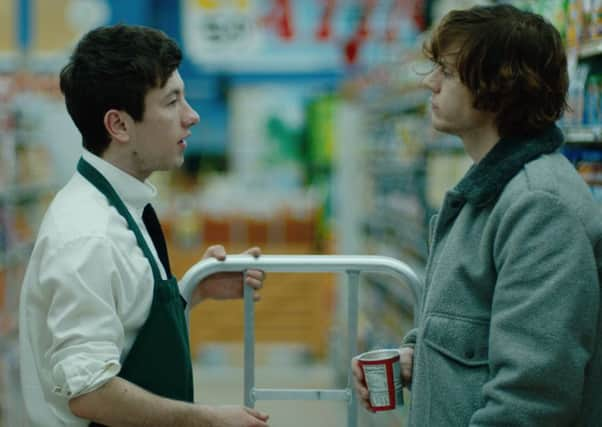Film reviews: American Animals | Puzzle | The Miseducation of Cameron Post


A smash-and-grab heist film that breaks boldly through the fourth wall, American Animals mixes drama and documentary in a way that reinvigorates what’s meant by a film based on true events. Set mostly in 2004, the movie, directed by Bart Layton (The Imposter), explores the audacious, elaborately planned, but horribly misguided attempt by a group of four American college students to steal millions of dollars’ worth of rare books from the special collections library of Transylvania University in Lexington, Kentucky.
Masterminded by art student Spencer Reinhard (Barry Keoghan) and his wildcard best friend Warren Lipka (Evan Peters, looking like a young Malcolm McDowell), the idea for the heist begins as a bit of a lark, an attempt to shake up their comfortably middle class lives by constructing a movie-like scenario in which they’re the main stars. But as they rope in fellow students Eric Borsuk (Jared Abrahamson) and Chas Allen (Blake Jenner), the playful camaraderie that comes from studying heist movies and figuring out the logistics of how to steal four volumes of naturalist James Audobon’s Birds of America – along with a first edition of Charles Darwin’s The Origins of Species (from which the film takes its title) – gradually gives way to more fraught relationships as the heist starts to take shape for real.
Advertisement
Hide AdLayton examines the fuzzy line between fantasy and reality in intriguing ways, keeping the action slick and movie-like during the planning stages (at one point even paying brilliant homage to Ocean’s Eleven), then roughing up the style as the reality of what they’re doing starts seeping in. But he brings the latter aspect more prominently to the fore by folding new interviews with the real versions of the protagonists into the mix from the start.
Watching these now thirty-something men reflect on the dramatised actions of their 20-year-old selves provides a sobering undercurrent to all the hi-jinx. It’s a great approach and even though elements of it have been seen before in the likes of Reds, American Splendour and Woody Allen’s Sweet and Lowdown, Layton’s use of the actual participants not only provides intriguing eyewitness testimony in a story that’s literally stranger than fiction, it more accurately reflects the unreliable way memory works: again and again we see the real guys’ individual recollections contradicting details of something we’ve just watched dramatised, ensuring the whole film has a bit of a post-modern Rashomon vibe.
At its core, though, it’s a trenchant exploration of the damaging disconnect that exists between the unremarkable lives of its relatively privileged protagonists and the great lives they clearly feel it’s their birthright to lead as 21st century Americans. Far from glamourising them, the film functions as a sad indictment of social system that perpetuates the myth that the biggest crime is being ordinary.
On the subject of ordinary lives, Puzzle is a frustrating celebration of the virtue of living one. Starring Kelly Macdonald as a mousy American housewife who finds respite from her blandly predictable existence by completing jigsaw puzzles, the film plays more like a metaphor in search of a movie than a particularly great showcase for the oft underused Scottish star. Kicking off with Macdonald’s character, Agnes, hunting on her hands and knees for a piece of broken crockery, the film quickly builds on this woman-searching-for-the-missing-pieces-of-her-life imagery by having her complete a birthday gift jigsaw puzzle in what we’re led to believe is record time. Having spent her whole life selflessly fitting into the lives of her family, this is clearly a woman who knows where everything fits. But her newly ignited passion for “puzzling” gradually starts opening her up to the possibility that maybe she’s not as cut out for the limited life she’s been living as she previously thought. As tedious as all this might sound, the film deserves some credit for the sincerity with which it approaches Agnes’s midlife crisis. It’s just too bad Agnes has been written as a sort of sub-Forrest Gump-style savant. For a large part of the film it’s unclear if she’s supposed to be on the autism spectrum or just the victim of egregious indie filmmaking quirkiness; director Marc Turtletaub and writers Oren Moverman and Polly Mann don’t seem to know. It’s only when Macdonald manages to escape all the film’s suffocating symbolism in the final 20 minutes that she’s finally able to piece together a more coherent picture of someone finally taking charge of her life. Though it’s not enough to save the film, if Reese Witherspoon gets round to producing her adaptation of Gail Honeyman’s best-seller Eleanor Oliphant is Completely Fine anytime soon, she needn’t look very far to fill the lead role.
Up-and-coming writer/director/actor Desiree Akhavan follows up her wonderful 2014 debut Inappropriate Behaviour with The Miseducation of Cameron Post, a low-key, pleasingly melodrama-free coming of age movie about a grunge-loving gay teen
(Chloë Grace Moretz) sent to a sexuality conversion camp by her religious aunt. Avoiding the usual tropes of the coming of age genre, the film offers up instead an authentic-seeming portrait of a girl whose strong sense of self quietly exposes the insecurities and intolerance of those around her. ■